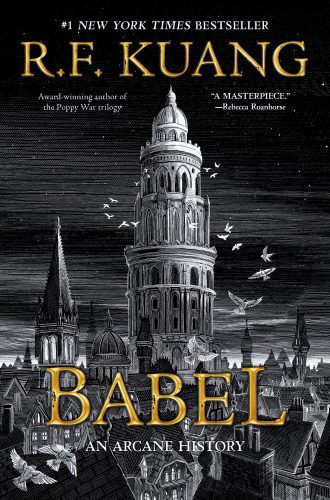When I saw the promotional material rolling out for R F Kuang’s latest novel, Babel, I immediately put it on my to-be-read list. There were so many aspects of the book that intrigued me: the gorgeous cover, the Victorian setting, the promise of a story about students standing up against the British Empire to save their countries from imperialism and war. As soon as I could, I got myself a copy and dug right in.
Reading Babel was a strange experience for me. I have never read a book that made me feel so many contradictory emotions. Babel is a rich and nuanced novel which explores the ways colonisation, linguistics and translation intersected to promote 19th century British imperialism. I love this fresh and unique perspective and admire the way Kuang delved into it. However, as a story, there are many aspects of Babel that left me feeling disappointed and frustrated. Babel just wasn’t a novel that worked well for me, even though I enjoyed and appreciated its themes.

“Que siempre la lengua fue compañera del imperio; y de tal manera lo siguió, que junta mente començaron, crecieron y florecieron, y después junta fue la caida de entrambos.”
“Language was always the companion of empire, and as such, together they begin, grow and flourish. And later, together, they fall.” – Antonio de Nebrija – Gramática de la Lengua Castellana
After being orphaned by the 1828 Asiatic Cholera epidemic, an 11-year-old Chinese boy is whisked away from his home by a mysterious man named Professor Lovell, who appeared at the last minute, saving his life with a healing silver bar before offering him a choice. He could stay in Canton and struggle for the rest of his life, or he could sign a contract to become Lovell’s ward. This wardship means moving to London with the Professor where he will be sheltered, supported and fed, as long as he studies diligently to get into Oxford University’s Royal Institute of Translation. This institute, affectionately known as Babel, is the British Empire’s centre of translation and the core of its silver industrial revolution. The proprietary enchanted silver bars Babel manufactures make everything in the empire function at maximum efficiency.
At Oxford, the boy, Robin, pours himself into his pursuit of knowledge, makes friends his own age for the first time since coming to the country, and genuinely falls in love with the institution and the life he leads there. Then one day he’s approached by the Hermes Society, an organisation of rogue scholars who want to undermine the empire from within. Robin tries to live a double life, embracing Babel and its opportunities while also supporting Hermes’ agenda. But when Britain turns its guns toward his motherland over silver and opium, Robin must choose quickly: to serve the empire while Britain destroys his homeland, or fully embrace his anti-colonialist instincts and fight back against the empire that once gave him purpose.
Alternative history and sterling magic
“But unlike Canton, London had a mechanical heartbeat. Silver hummed through the city. … London had accumulated the lion’s share of both the world’s silver ore and the world’s languages, and the result was a city bigger, heavier, faster and brighter than nature allowed. London was voracious, was growing fat on its spoils and still, somehow, starved… London — lovely, ugly, sprawling, cramped, belching, sniffing, virtuous, hypocritical, silver-gilded London — was near to a reckoning, for the day would come when it either devoured itself from the inside or cast outward for new delicacies, labour, capital and culture on which to feed.” – pp. 19-20
I loved the themes Kuang explored throughout Babel and the ways she played with history and historical facts to create her alternative Victorian world. Before reading this novel, I didn’t know how important silver was as a currency during the 19th century.
Kuang uses this fact and takes it a step further, giving silver a magical property that allows it to trap and manifest the meaning lost between languages while trying to translate them. By using match-pairs — paired words in two different languages with similar meanings etched onto silver bars — the scholars at Babel can make life around England more pleasant and efficient. Carriages can drive on autopilot, sewage systems never get clogged or stinky, and food will never go bad in pantries.
Anyone can benefit from silver-enhanced technology as long as they can afford Babel’s installation and maintenance fees. As such, only the British elites can enjoy the full benefits of silver bars. The poor, working class and colonial subjects aren’t as fortunate. In fact, they may end up as victims of the silver industrial revolution as they lose jobs to silver-enhanced machines or their lives in silver-enhanced industries. All of this combines to give us an idea of the beauty and horror of the British Empire at its peak.
Babel is also a book about the ways academics, particularly translators, may have been wittingly or unwittingly complicit in the horrors of colonialism. From their comfortable positions in the Institute of Translation, many of the scholars working in Babel are either unaware of the empire’s horrors in the colonies, or actively pushing to worsen conditions elsewhere so that they could reap more benefits and enrich the institutions. But most importantly, Babel was willing to exploit students from British colonies, forcing them to make match pairs from their own languages to benefit the empire as much as possible. If these students openly question the ways their languages and labour are being exploited by the system, they are punished severely.
In all, Babel shows just how creepy and sneaky colonialism was during the 1800s, and even points out some of the legacies that linger to this day.
Criticism
But as much as I loved the themes and histories Kuang explored in this novel, I ultimately didn’t like the book for three main reasons.
I love long books. I like books that can take you for a ride for weeks on end, thrilling you in some way on every page. I had hoped for a similar experience in Babel, as the book is over 500 pages long and had a promising start as Robin is plucked from his home and forced to adjust to life in England, London and then Oxford. I was excited reading about his run in with the Hermes Society and looking forward to seeing how he would balance his bizarre double-life.
But the book sags from this point, picking up with a few bursts of action and a sprinkle of mystery in-between. Much of the middle was pages upon pages about Robin and his cohort sitting in on lessons, studying for exams or doing translation or silver working internships. In addition, Kuang adds a lot of historical contexts to the racist, sexist and imperialist things the white British characters were doing and saying in the book in a series of footnotes throughout the novel. At first, I didn’t mind these footnotes, but toward the end of the book, Kuang began using them for character development, giving her readers insights about events, circumstances and even the inner thoughts about characters who were otherwise underdeveloped. By the end, I felt like I had finished reading for a degree in history and linguistics. While I am grateful for the information and all of the research and context Kuang painstakingly interweaves throughout the novel, by the middle of the book, it became a taxing reading experience.
I was willing to slog through reading Babel despite the awkward pacing because I was fascinated about the characters and how they would change. There, too, I was disappointed because the characters didn’t feel as fleshed out as I hoped they would be. They all started out so strong in the beginning of the book, and then they all just seemed to transition into plot puppets, at times doing things that were contradictory to their established personalities and psyches just to advance the plot.
For example, Ramy is one of the first people Robin meets. He’s established as a quick-witted character who can make rapid judgements about a person and either point it out, or adjust himself to suit whatever situation he happens to be in. But there are instances where Robin begins acting strangely and Ramy just doesn’t notice his oddness. Then, the next time we see him, Ramy has transitioned to his sharp-minded self again. There are several other instances of this happening with other characters throughout the book, where they act in contradictory ways seemingly just for the plot. This made the emotional ending of the book fall flat for me, leaving me feeling cheated rather than satisfied.
I feel like the book didn’t give me what it promised. The full title for this novel is Babel: Or the Necessity of Violence: An Arcane History of the Oxford Translator’s Revolution. I kept on reading because I sincerely hoped that all the fine details and awkward characters would straighten themselves out in the end and that I would get a grand finale, a real revolution to foil the Empire once and for all.
I was disappointed. While I understood the mild revolution, I was dissatisfied by its lacklustre execution. It wasn’t nearly as grand as the title, internal academic analysis and slow build ups to action lead me to believe it would be. While the ending does show how devastating the translators’ stand was on the empire, it just didn’t hit the tone I was hoping for and the slow pace made the consequences feel less urgent and dire than they actually were. When I put the book down, I just felt angry over the time I wasted rather than thrilled about the journey’s end.
Conclusion
I’m sad that Babel wasn’t my cup of tea. I really had high hopes for this novel because it covered so many themes, timelines and histories that I have been excited to read about. I am impressed and grateful to Kuang for the dedication, time and research she put into bringing Babel and this alternative Victorian world to life. Every page was marked with all her labours of love and her dedication to being as detailed and accurate as she could be to our actual real-life history. But I believe that so much was lost along the way as this book transitioned from a novel into something that felt more like a dense research thesis.
If you’re a student of linguistics and you’re fascinated about the intersections of colonialism and language, then this would be a great slow-burn book for you. If you’re a student of history and you want to read something that details many of the complexities of colonialism and the chaos of the British Empire, then this may be a great supplement to your history readings. But if you’re coming in for a rich story filled with vibrant characters, maybe this won’t be the book for you. But who knows. Maybe your opinion may just differ from mine and you will enjoy the slow and chaotic ride into Babel and beyond.








